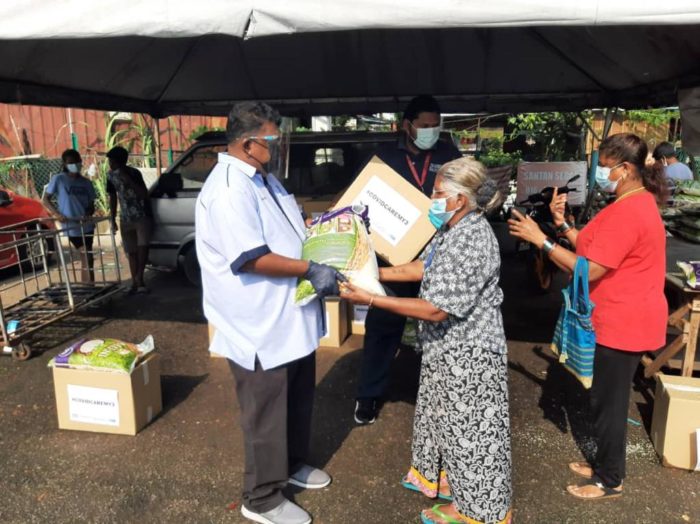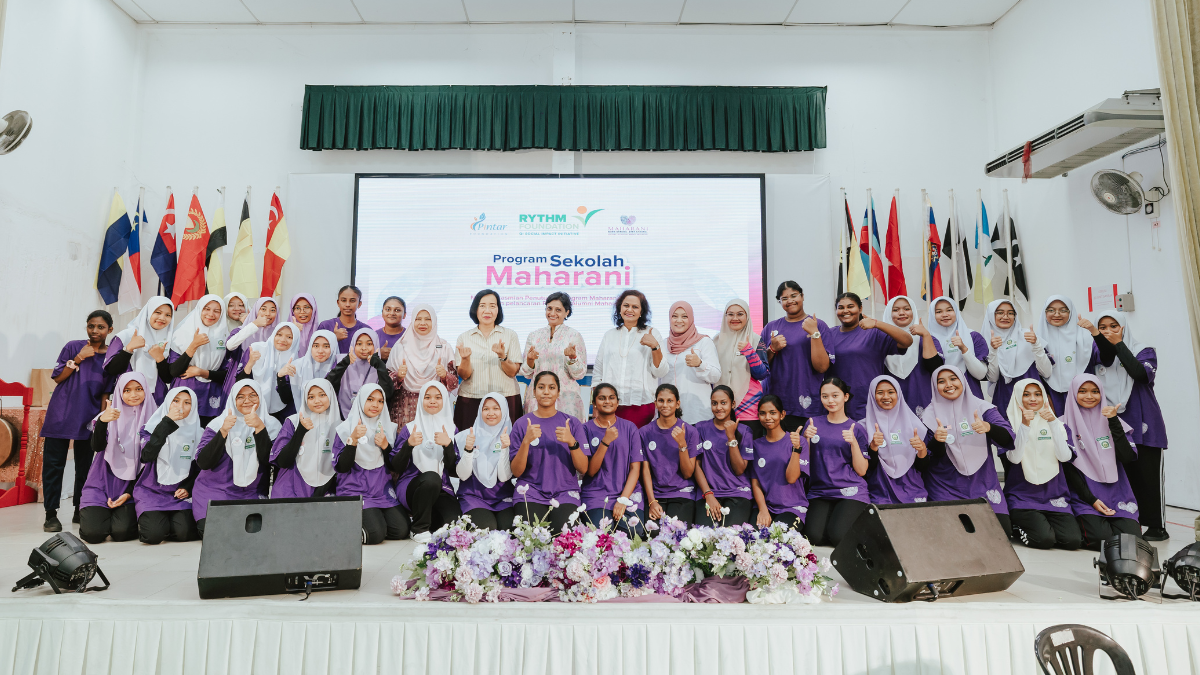While the news and social media are rife with stories of famished families raising white flags to plead for help during the pandemic, hunger is not the only struggle faced by low-income groups in Malaysia.
The bottom 40 percent (B40) of Malaysian households are seeing their finances stretched thinner than ever, having gone weeks without earning any income during the lockdowns in the face of a growing backlog of unpaid rent, utilities and other bills. Many have been facing mental health issues arising from anguish over their survival and isolation. The cumulative effect of this is becoming more evident in the way communities are reacting.
“They have stopped communicating with each other and there is no longer neighbourly camaraderie because everyone is suspicious of who could spread COVID to them. The impact is so different for everyone; they’re not just struggling for food. Sometimes their predicaments can be very unusual,” said Maalini Ramalo, Director of Social Protection of the Development of Human Resources for Rural Areas (DHRRA) Malaysia.
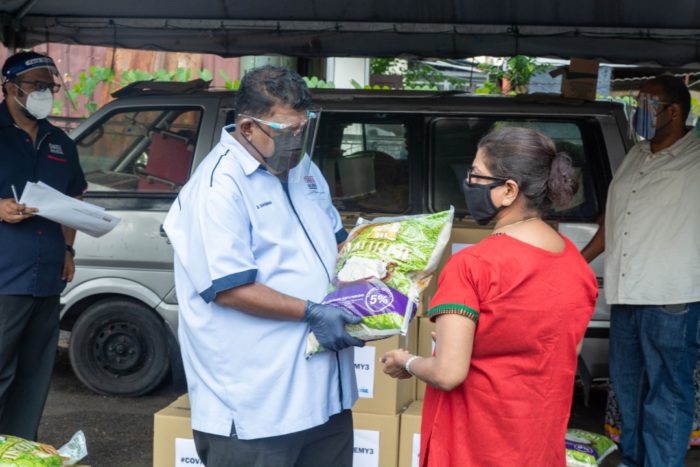
DHRRA is a voluntary non-profit that has been on a quest to build self-sufficiency and resilience amongst impoverished rural communities since it was registered in 2006. It is no stranger to RYTHM Foundation, having collaborated in the past to help stateless children attain an education.
“One of our goals was to be the voice of the rural folk because in the past, their needs have not really been put forward. However, as time went on, we realised that there is also poverty amongst the urban communities. So, we started addressing more issues beyond the rural areas because our main objective is the eradication of poverty,” said Maalini.
Also read: Stateless Sisters are in School Thanks to RYTHM Foundation-DHRRA Malaysia Initiative
With countless programmes to address the needs of marginalised communities under their belt since their inception, DHRRA is one of the many organisations working on overdrive to support the low-income communities across the country since the pandemic struck in March 2020.
“When the lockdown was enforced last year, our beneficiaries started reaching out to us. Daily wage earners were losing jobs and did not have the means to support their families. All our phones were ringing off the hook, to a point that we had over 100 people calling different members of the organisation daily asking for help,” said Maalini.
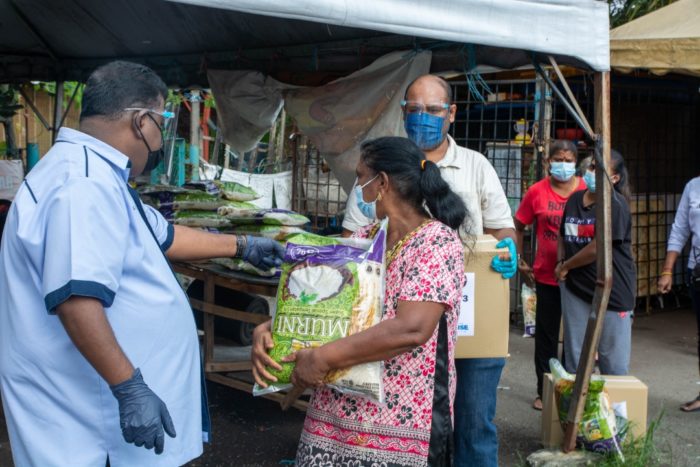
Launching into action, DHRRA came together with other NGOs to reach out to family and friends to raise funds to support these families. As money began flowing in, DHRRA set up their hotlines for anyone to reach out for assistance and kicked off their COVIDCAREMY initiative. Over time, they learned that people weren’t just worried about going hungry, they were worried about their overall survival. So, DHRRA began to expand its crisis relief to include the needs that are not commonly addressed.
“We had an instance where an elderly mother who had regularly been in touch with her children working outstation had not picked up the phone for two days. By the third day, the family reached out to us, and we had to break into the house only to find out that the mother had a stroke, and no one knew. Thankfully, she survived but you know, we take things for granted and these were lessons that we ourselves have been learning. The impact of COVID is so complicated and differs for everyone.”
Another distressing scenario that DHRRA also lent a hand to during the pandemic was when a whole family was under quarantine because some of them tested positive. However, the family could not afford testing for all the members of the household which included a person with disabilities. They reached out when the family member with disabilities fell so sick that he required treatment and DHRRA funded the testing for four priority family members who all tested positive including the person with disabilities.
“Today, we are more than just about emergency food relief. I think that it’s in the blood of most NGOs to focus on the overall development facet and not just the charity aspect and that’s exactly why we started looking beyond emergency food aid,” said Maalini.
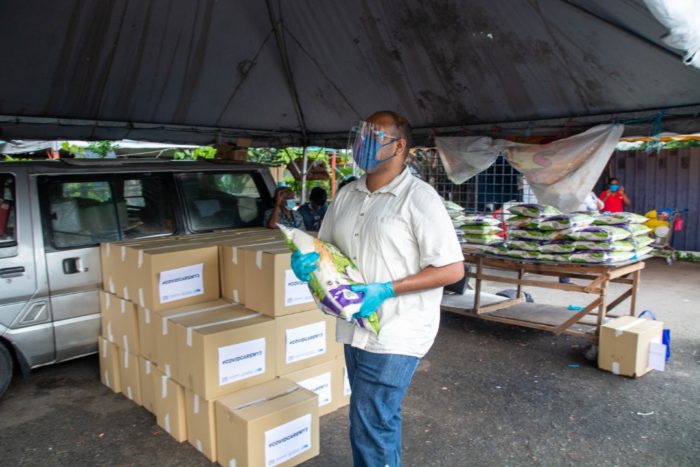
While the organisation is providing relief to those in varying predicaments through its many channels, it continues to provide food relief to the low-income groups. According to Maalini, these groups are continuing to fight for survival and taking on whatever temporary employment they can find to sustain themselves. The grocery aid provided by DHRRA ensures that these families have food available so that whatever money earned from picking up any kind of odd jobs can be channelled towards other important needs.
Last year, RYTHM sponsored the distribution of 10kg bags of rice to 500 families struggling with the impact of COVID-19; that number has doubled this year, as many more are financially strained by the seemingly never-ending lockdown in Malaysia. The distribution to the 1,000 daily wage earners, elderly, and foreign workers across the Klang Valley and around Selangor took place between June and July.
“The average estimation is that a 10kg bag of rice can sustain a family of 4-6 for at least two weeks. We want to provide them with a substantial aid so in addition to the rice packs, we also provide a grocery aid that consists of essential items worth RM150 each. The items vary from time to time depending on the in-kind donations that we receive, so it’s never less than that but sometimes it can be more,” said Maalini.
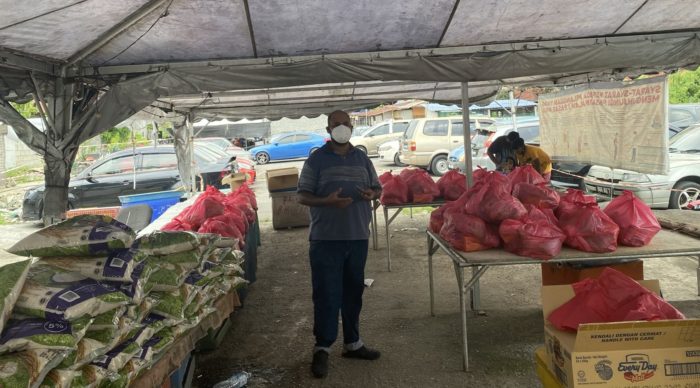 Also read: RYTHM Foundation Partners with DHRRA to Distribute 500 Packets of Rice During COVID-19
Also read: RYTHM Foundation Partners with DHRRA to Distribute 500 Packets of Rice During COVID-19
DHRRA has an organised vetting system that includes working with district officials, community leaders and volunteers trained by their organisation to identify those most in need and assist in delivering the items to families. The volunteers also come from within the B40 communities themselves and are paid for the work they do, thus also providing them with a source of income. They are also equipped with essential items such as masks, personal protective equipment (PPE), hand sanitisers and shields to prioritise protection.
“It’s important to mention that the COVIDCAREMY initiative started off because of trust. We received the first 500 packs from RYTHM Foundation which was built upon the existing relationship between our two organisations. We are very grateful to renew that partnership to provide 1,000 bags of rice to more families because our whole initiative is dependent on partnerships with organisations like RYTHM. With the funding we received for the rice bags, we have one less thing to worry about and can now focus on gathering the remaining resources and fundraising to meet the manifold needs of these communities.”
Also read: RYTHM Foundation Helps Malaysian Children Stay in School
 DHRRA is a voluntary non-profit that has been on a quest to build self-sufficiency and resilience amongst impoverished rural communities since it was registered in 2006. It is no stranger to RYTHM Foundation, having collaborated in the past to help stateless children attain an education.
DHRRA is a voluntary non-profit that has been on a quest to build self-sufficiency and resilience amongst impoverished rural communities since it was registered in 2006. It is no stranger to RYTHM Foundation, having collaborated in the past to help stateless children attain an education.
 Launching into action, DHRRA came together with other NGOs to reach out to family and friends to raise funds to support these families. As money began flowing in, DHRRA set up their hotlines for anyone to reach out for assistance and kicked off their COVIDCAREMY initiative. Over time, they learned that people weren’t just worried about going hungry, they were worried about their overall survival. So, DHRRA began to expand its crisis relief to include the needs that are not commonly addressed.
Launching into action, DHRRA came together with other NGOs to reach out to family and friends to raise funds to support these families. As money began flowing in, DHRRA set up their hotlines for anyone to reach out for assistance and kicked off their COVIDCAREMY initiative. Over time, they learned that people weren’t just worried about going hungry, they were worried about their overall survival. So, DHRRA began to expand its crisis relief to include the needs that are not commonly addressed.
 While the organisation is providing relief to those in varying predicaments through its many channels, it continues to provide food relief to the low-income groups. According to Maalini, these groups are continuing to fight for survival and taking on whatever temporary employment they can find to sustain themselves. The grocery aid provided by DHRRA ensures that these families have food available so that whatever money earned from picking up any kind of odd jobs can be channelled towards other important needs.
Last year, RYTHM sponsored the distribution of 10kg bags of rice to 500 families struggling with the impact of COVID-19; that number has doubled this year, as many more are financially strained by the seemingly never-ending lockdown in Malaysia. The distribution to the 1,000 daily wage earners, elderly, and foreign workers across the Klang Valley and around Selangor took place between June and July.
While the organisation is providing relief to those in varying predicaments through its many channels, it continues to provide food relief to the low-income groups. According to Maalini, these groups are continuing to fight for survival and taking on whatever temporary employment they can find to sustain themselves. The grocery aid provided by DHRRA ensures that these families have food available so that whatever money earned from picking up any kind of odd jobs can be channelled towards other important needs.
Last year, RYTHM sponsored the distribution of 10kg bags of rice to 500 families struggling with the impact of COVID-19; that number has doubled this year, as many more are financially strained by the seemingly never-ending lockdown in Malaysia. The distribution to the 1,000 daily wage earners, elderly, and foreign workers across the Klang Valley and around Selangor took place between June and July.
 Also read: RYTHM Foundation Partners with DHRRA to Distribute 500 Packets of Rice During COVID-19
DHRRA has an organised vetting system that includes working with district officials, community leaders and volunteers trained by their organisation to identify those most in need and assist in delivering the items to families. The volunteers also come from within the B40 communities themselves and are paid for the work they do, thus also providing them with a source of income. They are also equipped with essential items such as masks, personal protective equipment (PPE), hand sanitisers and shields to prioritise protection.
Also read: RYTHM Foundation Partners with DHRRA to Distribute 500 Packets of Rice During COVID-19
DHRRA has an organised vetting system that includes working with district officials, community leaders and volunteers trained by their organisation to identify those most in need and assist in delivering the items to families. The volunteers also come from within the B40 communities themselves and are paid for the work they do, thus also providing them with a source of income. They are also equipped with essential items such as masks, personal protective equipment (PPE), hand sanitisers and shields to prioritise protection.

